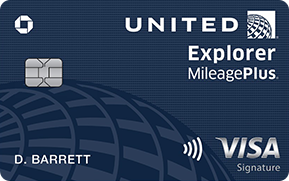Summary
See the pros and cons of United miles and how they compare to other miles and points programs.
The content on this page is accurate as of the posting date; however, some of our partner offers may have expired. Please review our list of best credit cards, or use our CardMatch™ tool to find cards matched to your needs.
There’s much to be said in favor of the United MileagePlus program: United has a huge airline network that includes 26 Star Alliance partners covering most parts of the globe, and the carrier is flexible enough in its routing rules to accommodate many destinations and itineraries.
However, determining the value of United miles mainly comes down to this question: Do you have the flexibility to book a Saver Award? If you are flexible in your travel days and flight times, you may find that United miles are a great value. But if you are particular about the days and times you like to fly, you may find the United MileagePlus program to be a fizzle.
See Related: Best credit card for airline miles
United℠ Explorer Card | |
 Why should you get this card? With a generous sign-up bonus, the United Explorer Card makes it easy to earn a free flight quickly. If you fly United often, it is easy to make up for the card’s $95 annual fee (waived first year). | More things to know:
|
United miles value
By our estimates, United miles are worth around 1.5 cents per mile – higher than some rewards program points, but not as valuable as many competing airlines’ miles.
Why United miles are worth less than some competitors
The value of your United miles can vary drastically, depending on whether you redeem them for a Saver or an Everyday Award. While Saver Awards are usually a very good value, particularly for business- and first-class fares, Everyday Awards are generally very expensive across the board. As you can see in the chart below, United Everyday Awards are worth only around 1 cent per mile:
| Fare type | Value per mile (cents) |
| Economy Saver | 1.4 |
| Business/First-Class Saver | 2.7 |
| Economy Everyday | 1.0 |
| Business/First Class Everyday | 1.4 |
Although United’s Saver Awards beat the value of award seats on many other airlines, when we look at the average value of awards over various routes and times of year, the low value of Everyday Award fares brings down the value of United miles overall.
How to value your United miles
We’ve told you how we value United miles, but the value of a mile is actually subjective and depends on both your redemption preferences and what you ultimately use it for. Here are some questions to consider when trying to determine how much United miles might be worth to you:
- Which redemption option do you prefer? Do you intend to redeem your miles strictly for airfare? Or are you eyeing another redemption option, such as merchandise or a gift card? If the latter is true, you may have to shave half a cent or more off the value of your miles, since the value of most other redemptions is low.
- Which class do you prefer to fly in? Are you more of an economy flyer, or do you aspire to travel in business or first class? While Saver Awards in economy class are a great way to stretch your United miles, you will find that Saver Awards in business and first class on United, as well as its partner airlines, offer even better value per mile.
- Where are you flying to? The value of awards can vary by route, and you may find that it is either difficult or impossible to find Saver Awards for certain destinations, especially very popular ones. You should check the value of United miles for your intended destination ahead of time to make sure the redemption value is good.
- When do you intend to fly? You will likely have a hard time locating a Saver Award during peak travel season, which could drive down the value of your miles if you end up having to redeem them for an Everyday fare instead.
- How flexible are you? Flexibility is key to getting the most out of your United miles. If you are flexible on the time of day that you fly out on, and if you can adjust your date of departure by a day or two – leaving on Thursday instead of Friday, for instance – you may have much better luck finding a Saver Award. And if you are open to multiple destinations and times of year, that’s even better: You can typically find very good values, thus significantly increasing how much each of your miles is worth.
- How far away is your flight? If you want to improve your chances of finding a Saver fare, purchasing your flight far in advance is generally a good idea, particularly since United uses dynamic pricing for all award seats (including those on Star Alliance partner airlines). In other words, booking at the very last minute doesn’t have the same potential to drastically improve the value of your miles that it used to, though it’s possible to find a Saver fare still available. However, you’ll also have to factor in a 1,500- to 4,500-mile fee if you book less than 21 days in advance.
Calculating the value of United miles
Once you’ve decided on redemption and figured out the costs of that option, you can take the dollar value (minus any taxes and fees that you have to pay) and divide it by the number of miles to determine the value of each one:
United Miles Value = Reward Value (in dollars) / Number of Miles
Note that this will be a rough estimate, especially when it comes to airfare. Countless factors can affect the value of a flight, such as the miles you lose out on earning when you book with miles instead of dollars, the lowest possible price you could pay by checking back with the site repeatedly over time, the other promotions and discounts you forgo when you use miles, the lowest possible price you could pay by booking a flight with a competing airline, and so on.
But for a basic comparison of values across airline rewards programs, this simple formula should do the trick.
How flexible are United miles?
With United miles, you have a large number of destinations and airline partners to choose from, and United is fairly flexible on how you redeem miles. But without knowing exactly how many you’ll need for a flight, you’ll have to spend a bit more time fiddling with United’s reservation calendar to find an itinerary that works for your schedule and maximizes the value of your rewards. (Tip: When you’re on United’s website, be sure to check the boxes that say “book with miles” and “flexible dates” to widen your search results.)
Here are the pros and cons of United miles:
Pros:
- United miles never expire.
- United has a vast flight network. With more than 19,000 daily flights to more than 1,300 destinations in over 190 countries, United and its 38 airline partners can take you almost anywhere you want to fly.
- If your travel plans are flexible, Saver Awards offer an exceptionally good value.
- Business- and first-class Saver Awards are an even better value than economy-class Saver seats, and you can find some great deals flying in luxury with United’s Star Alliance partners, too.
- MileagePlus members who book a multicity itinerary with at least three one-way awards can get one of those flight segments for free with United’s Excursionist Perk (if you can figure out the somewhat confusing routing restrictions).
- United doesn’t charge fuel surcharges on any award ticket, whereas some competitors charge hundreds of dollars in added fees for overseas fares.
- United is fairly relaxed with its routing restrictions – you have the option to book round-trip, one-way and multicity award tickets, as well as open-jaw itineraries (itineraries arriving and departing from different destinations).
- United no longer charges change fees on most domestic flights (or on any international flight originating in the United States).
- United also eliminated cancellation fees on award tickets in 2020. This means it will redeposit your miles back into your MileagePlus account for free, provided you cancel your reservation at least 30 days in advance.
- Beginning January 1, 2021, all MileagePlus members can confirm a same-day flight change for free, as long as the seat is in the same fare class. (Otherwise, you’ll have to pay the difference.)
Cons:
- There is limited availability of Saver Awards – you may not be able to find awards for popular destinations or during busy travel periods. (However, United has a fair amount of Saver Awards within its calendar.)
- While United does offer Everyday Award tickets that you can book for almost any available seat on any flight, they are very expensive.
- There is a $25 fee for booking phone reservations with United (waived for Premier Platinum and Premier 1K members).
- As of October 2020, award reservations booked less than 21 days in advance now require more miles – between 1,500 and 4,500, according to The Points Guy. This applies to both United and partner-operated flights.
- United Basic Economy award tickets issued after March 30, 2021, will be subject to change fees of up to $125, depending on status. United also charges a $125 fee for canceling an award reservation within 30 days of your departure date (reduced or waived for some elite members).
- Because United switched from a fixed award chart to dynamic pricing in 2019, the number of miles required for a flight fluctuate by date and are typically pricier during peak times (but less expensive for offseason travel).
- MileagePlus miles are awarded based on revenue rather than distance flown for United flights, so you can’t strategize your routing to maximize your mile earnings.
Are United miles worth it?
For the most part, yes. United miles have the potential to be very valuable, and if you can snag a large number of them through a sign-up bonus or because you fly often on United (at least during non-pandemic times), you will find many good redemption options through the carrier’s large flight network.
However, if you are weighing the pros of collecting United miles against a more flexible rewards program, say Chase Ultimate Rewards, you’ll need to consider whether you are flexible enough in your travel plans to seek out Saver Awards in United’s flight schedule. But if you absolutely must fly out at the busiest travel times, you will likely get a subpar return on your United miles.
Editorial Disclaimer
The editorial content on this page is based solely on the objective assessment of our writers and is not driven by advertising dollars. It has not been provided or commissioned by the credit card issuers. However, we may receive compensation when you click on links to products from our partners.




